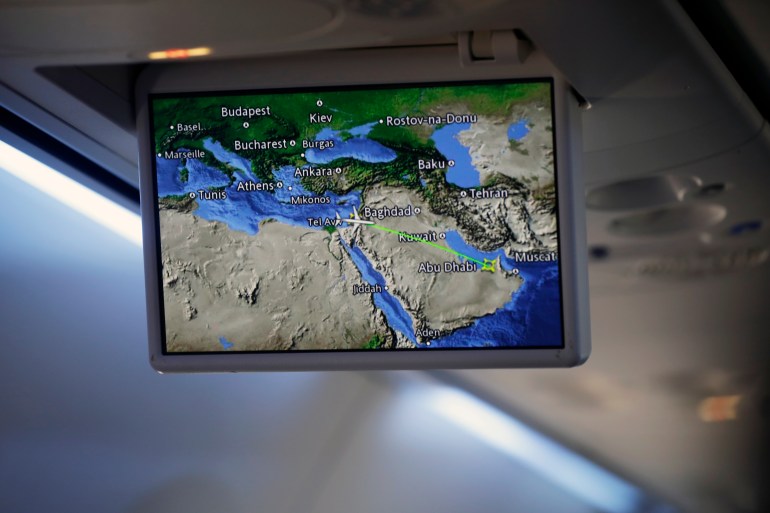The UAE and Israel are working on setting up a marine project linking the city of Umm Al Rashrash (Eilat) with the city of Jeddah, Saudi Arabia, where the idea of the scheme was launched during a visit from the UAE to Tel Aviv and conducted a field tour in the port of Eilat, and met with officials who will soon visit Abu Dhabi in order to continue the procedures for implementing the project .
According to "Israel Hayom" newspaper, the project aims to boost tourism in southern Israel and open the door to direct religious tourism between Saudi Arabia and Israel, by allowing Hajj and Umrah convoys from 48 Palestinians to travel through the sea corridor to Jeddah and from there to Mecca.
The transfer and transfer of convoys of pilgrims and Umrah performers from 48 Palestinians is an alternative to the Jordanian Hashemite tutelage, which was overseeing the organization of Hajj and Umrah caravans, according to the agreement concluded in 1978 between the Israeli government and the late Jordanian King Hussein bin Talal.
And 48 Palestinians used to perform Hajj and Umrah through the Jordanian guardianship over the pilgrims and grant them temporary Jordanian passports, noting that the Saudi authorities announced the lifting of this guardianship in November 2018, and confirmed that they require receiving pilgrims and Umrah performers from 48 Palestinians only if they have a fixed Jordanian passport .
Sea lane
The sea corridor project is considered the first actual initiative for Israeli-Emirati cooperation in Eilat, where he participated in the visit that took place a few days ago in order to follow up the progress of the project, the group's president and CEO of the "Dubai Ports World" group, and the Emirati shipping group Sultan Ahmed bin Sulayem, accompanied by a delegation of businessmen Emiratis who wandered in the port of Eilat.
According to the project plan - which was reviewed by Eilat Port Director Gideon Golber and port owner Shlomi Vogel in front of the Emirati delegation - the passenger ships and tourists will dock at the port of Eilat, so that this will enable the convoys of pilgrims and Umrah pilgrims from 48 Palestinians who want to travel to Mecca, board and sail directly to Jeddah, on About 70 km from Mecca.
According to the director of Eilat Port, the members of the Emirati delegation, including Sultan Bin Sulayem, were enthusiastic about the plan and said that it could be implemented, adding, "Soon I will accompany an Israeli delegation accompanied by the management of the port of Eilat to the Emirates, where a preparatory session will gather us remotely to visit the Israeli delegation to Abu Dhabi."
A screen showing the course of the plane that transported an Israeli delegation to Abu Dhabi in late August (European)
Pilgrim caravans
"It was a very enjoyable and friendly visit ... and since Israel and Eilat in particular are suffering from a major tourism crisis, we believe that the movement of travelers from Eilat to Saudi Arabia can benefit, enhance and stimulate tourism, as the corridor will provide a very short cruise, which will make the trip to Mecca easier and faster," Goulber added. The tourism potential through the sea corridor reaches about two million passengers annually, which will definitely have a positive impact on tourism in Eilat. "
In addition to the direct sea line between Israel and Saudi Arabia and the caravans of pilgrims and Umrah performers, cooperation in operating a regular container ship line between Eilat and Jebel Ali Port in the UAE will be examined, a journey that takes about 10 days.
In addition, there is another Israeli-Emirati cooperation currently being worked on, which is the export of vegetables and fruits from farmers in the Jordan Valley and Arava settlements to the UAE on board of refrigerated ships.
Suez Canal
The Israeli newspaper "Globes", which deals with economy and trade, previously reported that Tel Aviv had proposed to Abu Dhabi the establishment of a pipeline to pump oil, gas and crude oil derivatives to Europe and the American continent, by using the pipeline network of the Israeli company "Katsa" to transport oil from Eilat to the port. Ashkelon (Ashkelon).
The Israeli proposal submitted to the Emirates calls for linking the oil station of "Katsa" in Eilat to the Saudi network that reaches Yanbu Refinery (700 kilometers from Eilat), as linking the Saudi pipeline network to the Israeli network will contribute to reducing the time period for transporting oil and its derivatives from Saudi Arabia and Gulf countries to It will also save the world from transportation costs and exempt from paying fees for the transit of ships and tankers in the Suez Canal.
Israeli estimates indicate that Saudi Arabia and Gulf countries are looking with interest to the possibility of activating pipelines and establishing a land corridor for transporting and exporting oil to the world by saving transport and security costs, and also reducing the maritime route that poses a threat to oil tankers from threats to targeting from Iran and Yemen in the Arabian Gulf and the Straits of Hormuz. And Bab al-Mandab, and also pirate attacks at the entrance to the Red Sea will be repelled by its path near Somalia.
It should be noted that Cairo’s relinquishment of sovereignty over the islands of Tiran and Sanafir and their transfer to Saudi Arabia stimulated Tel Aviv and Abu Dhabi to formulate a plan for the sea corridor project from Eilat to Jeddah and to link oil pipelines between the UAE, Saudi Arabia and Israel, knowing that Tiran and Sanafir control the entrance to the Gulf of Aqaba and the ports of Aqaba. Jordan and Eilat, located along a stretch of strategic importance, representing Israel’s route to entering the Red Sea.

